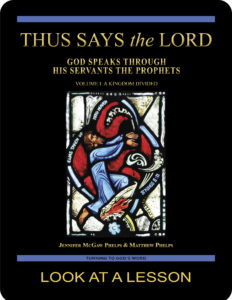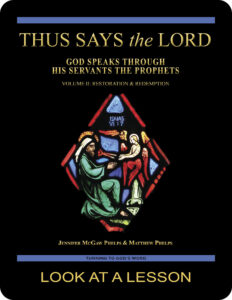satan & Beelzebub
 In the Gospel According to Matthew 12:22–32 (NABRE), we encounter two concepts for the devil that come from Hebrew, satan and Beelzebub. The word “satan” comes from a Hebrew word that means “adversary.” Beelzebub likely means “the Lord of the high place,” and is used as a name for various pagan gods. The ancients would set up altars to false gods on various high places, a practice God denounces throughout the Old Testament.
In the Gospel According to Matthew 12:22–32 (NABRE), we encounter two concepts for the devil that come from Hebrew, satan and Beelzebub. The word “satan” comes from a Hebrew word that means “adversary.” Beelzebub likely means “the Lord of the high place,” and is used as a name for various pagan gods. The ancients would set up altars to false gods on various high places, a practice God denounces throughout the Old Testament.
Why do you think it is that the ancients had many different words for the devil? Why do you think that we as Christians view all of these words as referring to the same thing? Do you believe that there is a single devil? What characteristics do these two words suggest are most important about the devil?
related topics: demonic possession; evil; Evil One
you also may like our two-part study of the prophets

 Thus Says the LORD: God Speaks Through His Servants the Prophets—Volume I: A Kingdom Divided examines the prophets in their historical context using the First and Second Books of the Kings and other Old Testament passages written before the Babylonian Exile in 586 B.C. Volume II: Restoration & Redemption looks at the post-exilic prophets. This 51-lesson Catholic Bible study builds on The United Kingdom of Israel: Saul, David & Solomon Foreshadow Christ the King. Click on the books’ covers to view a sample lesson from each volume.
Thus Says the LORD: God Speaks Through His Servants the Prophets—Volume I: A Kingdom Divided examines the prophets in their historical context using the First and Second Books of the Kings and other Old Testament passages written before the Babylonian Exile in 586 B.C. Volume II: Restoration & Redemption looks at the post-exilic prophets. This 51-lesson Catholic Bible study builds on The United Kingdom of Israel: Saul, David & Solomon Foreshadow Christ the King. Click on the books’ covers to view a sample lesson from each volume.
 Click on the picture of the statue of Moses with horns (above) to learn more about Lost in Translation. A new entry is archived each Monday. Contact us to receive Lost in Translation by email every week. You may use any of the contact links on our website to ask Matthew a question.
Click on the picture of the statue of Moses with horns (above) to learn more about Lost in Translation. A new entry is archived each Monday. Contact us to receive Lost in Translation by email every week. You may use any of the contact links on our website to ask Matthew a question.
